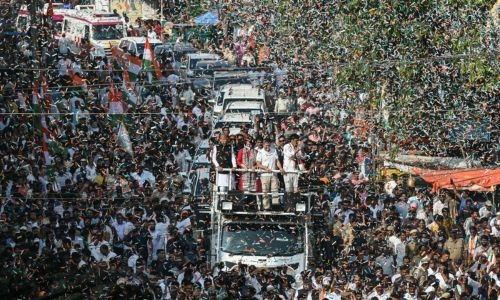India to hold marathon national election from April
AFP | New Delhi, India
The Daily Tribune – www.newsofbahrain.com
India announced Saturday that national polls would begin on April 19, with Prime Minister Narendra Modi strongly favoured to win a third term in the world's biggest democracy.
Nearly a billion people are eligible to cast ballots in what will be the largest exercise of the democratic franchise in human history, conducted over six weeks.
Many consider Modi's re-election a foregone conclusion, owing to both the premier's robust popularity a decade after taking office and a glaringly uneven playing field.
His opponents have been hamstrung by infighting and what critics say are politically motivated legal investigations aimed at hobbling any challengers to the ruling Bharatiya Janata Party (BJP).
"We will take democracy to every corner of the country," chief election commissioner Rajiv Kumar said at a press conference in New Delhi announcing the voting dates.
"It is our promise to deliver a national election in a manner that we... remain a beacon for democracy around the world."
Voting will be staggered over seven stages between April 19 and June 1.
Ballots from around the country will be counted all at once on June 4 and are usually announced on the same day.
Modi, 73, has already begun unofficial campaigning as he seeks a repeat of his landslide wins of 2014 and 2019, forged in part by his muscular appeals to India's majority faith.
In January, Modi presided over the inauguration of a grand temple to the deity Ram in the once-sleepy town of Ayodhya, built on the grounds of a centuries-old mosque razed by Hindu zealots.
Construction of the temple fulfilled a long-standing demand of Hindu activists and was widely celebrated across India with back-to-back television coverage and street parties.
- Divided opposition -
The opposition Congress, which led India's independence struggle and ruled the country almost uninterrupted for decades after its conclusion, is meanwhile a shadow of its former self and out of office in all but three of the country's 28 states.
Its leaders have sought to stitch together an alliance of more than two-dozen regionalist parties to present a united front against the BJP's well-oiled and well-funded electoral juggernaut.
But the bloc has been plagued by disputes over seat-sharing deals, suffered the defection of one of its members to the government and has so far been unable to publicly agree which of its leaders will be its prime ministerial candidate.
Several party leaders in the alliance are the subject of active investigations or criminal proceedings, and critics have accused Modi's government of using law enforcement agencies to selectively target its political foes.
Rahul Gandhi -- the most prominent Congress politician whose father, grandmother and great-grandfather all served as prime ministers -- was briefly disqualified from parliament last year after being convicted of criminal libel.
He faces at least 10 other defamation proceedings in courts around the country, many filed years ago by BJP officials and slowly snaking their way through India's glacial criminal justice system.
- Democratic backsliding -
Gandhi, 53, has criticised the government for democratic backsliding and its chest-thumping Hindu nationalism, which have left many of the country's 210-million-strong Muslim minority fearful for their futures.
He has also called into question Modi's probity by highlighting his close ties to tycoon industrialist Gautam Adani, whose business empire saw a market meltdown last year after a US short-seller investment firm accused it of corporate fraud.
But Gandhi has already led Congress to two successive humiliating defeats against Modi and there is no sign his efforts to dent the premier's popularity have registered with the public.
Published opinion polls are rare in India but a Pew survey last year found Modi was viewed favourably by nearly 80 percent of Indians.
A February poll of urban voters conducted by YouGov showed the BJP comfortably leading India's manifold opposition parties among 47 percent of those surveyed, while Congress was a dismal second at 11 percent.
"Wherever I go, I can clearly see that Modi will become PM for the third time," Amit Shah, India's home minister and Modi's closest political ally, said in a speech this week.
A total of 970 million people are eligible to vote in the election -- more than the entire population of the United States, European Union and Russia combined.
There will be more than a million polling stations in operation staffed by 15 million poll workers, according to the election commission.
Related Posts

